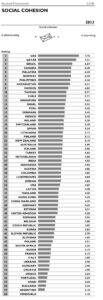
Social Cohesion – Why it matters
The recent social upheavals in countries as distant as Venezuela or the Ukraine should be no surprise to anyone that has analyzed in detail the IMD World Competitiveness Yearbook for the last years. Both countries sit at the bottom of our sample of countries, and especially so in criteria related to business and government efficiency. Be it either cause or an effect or other problems, truth is that these two countries have shown the damaging consequences of a lack of social cohesion. Ultimately, societies that do not build inclusive institutions end up confronting one part of the society with another.
In the 2013 Yearbook, the Ukraine and Venezuela rank respectively in the 52nd and 60th positions in social cohesion (survey question: “Social Cohesion is improving [Y/N]”). Portugal, Spain, Bulgaria and Argentina join Venezuela in the bottom five countries for this criterion. In 2011 and 2012, the Ukraine and Venezuela were the worst two countries out of sixty. Between 2008 and 2013, the countries where social cohesion has deteriorated the most are – not surprisingly – European: Portugal, Latvia, Spain, Luxembourg, France, Greece, and Germany.
The OECD characterizes a society cohesive if “it works towards the well-being of all its members, fights exclusion and marginalization, creates a sense of belonging, promotes trust, and offers its members the opportunity of upward social mobility.”[1] In the same article, the authors argue that the three pillars of social cohesion are social inclusion, social capital, and social mobility. Social inclusion is negatively related to income inequality; social capital is a combination of trust and civic engagement; social mobility reflects the degree to which people can change their position in society. We can immediately identify, based on this characterization, the cause for the lack of social cohesion in the countries below: in Venezuela and Argentina, social fragmentation results from income inequality, while the Ukraine lacks the necessary social capital to bring society together.
Social cohesion is a very important driver of long-term prosperity and competitiveness. Cohesive societies are politically stable and focus on economic growth and business development. Social cohesion itself is built over years, not overnight. It results from policies that allow everybody in society to share its prosperity. It makes competitiveness sustainable. Our ranking of social cohesion in 2008 explains 20 percent of the variation in Political Instability in 2013. By the way, on the “Risk of Political Instability”, the worst two countries in 2013 are…the Ukraine and Venezuela.

[1] OECD 2011, “Perspectives on Global Development 2012—Social Cohesion in a Shifting World”
Research Information & Knowledge Hub for additional information on IMD publications
IMD produces a yearly Smart City Index offering a balanced focus on economic and technological aspects of smart cities on the one hand, and “humane dimensions” of smart cities (quality of life, environment, and inclusiveness) on the other. In this...
With stagnant import volumes since 2021, and import prices at levels below those suggested by fundamentals, foreign exporters face an uphill battle to convert access to the Chinese market into revenues. Notably, the volume stagnation predates the ...
It has become conventional wisdom to view Europe as an economic powerhouse past its prime, overshadowed by the steady advance of the US and meteoric rise of China. Critics cite Europe’s shrinking share of global GDP, excessive regulation, and slug...
Inflows of foreign direct investment into China shows worrying trends despite its massive economy. While total FDI appears substantial at $163B in 2023, most growth comes from existing foreign subsidiaries rather than new entrants. Foreign manufac...
IMD World Competitiveness Center Report, 8 April 2025
Research Information & Knowledge Hub for additional information on IMD publications
Research Information & Knowledge Hub for additional information on IMD publications
Research Information & Knowledge Hub for additional information on IMD publications
Research Information & Knowledge Hub for additional information on IMD publications
Research Information & Knowledge Hub for additional information on IMD publications
Research Information & Knowledge Hub for additional information on IMD publications
IMD World Competitiveness Center Report, 14 November 2024, 8th edition
Research Information & Knowledge Hub for additional information on IMD publications
Research Information & Knowledge Hub for additional information on IMD publications
Research Information & Knowledge Hub for additional information on IMD publications
Research Information & Knowledge Hub for additional information on IMD publications






